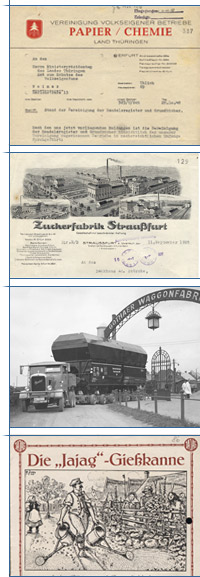Description
Thuringia has a very rich economic history. Important industries such as mining, metal and wood processing, glass and porcelain production and the textile industry as well as the new industries of the 19th and 20th century such as the electrical industry, the chemical industry, mechanical engineering and vehicle construction and the food industry were located here. Not to mention agriculture. However, before 1945 none of the many companies is known that it had an archive whose self-image was aimed at long-term, historical preservation of the documents and thus differed from a registry.
Through the nationalisation of large parts of trade and industry in the GDR, economic documents became state property and can now be found in public archives. Few large companies succeeded in re-privatizing after the political turn of 1989/90, only a few of which were prepared to face up to their own tradition with its bright and dark sides. These are Carl Zeiss and the Jenaer Glaswerk, which today maintain important corporate archives.
In the GDR, economic and corporate archives were treated as part of the state archives system. On the basis of the Ordinance on State Archiving of 11 March 1976, some company archives were confirmed as so called "Endarchive", but only for documents from the GDR period. Older documents had to be handed over to the responsible state archives in the following years. Many stocks of companies and state-owned enterprises as well as combines can therefore be found in today's state archives in Weimar (Erfurt district), Rudolstadt (Gera district) and in the Suhl branch of the Meiningen State Archives (Suhl district). In the state archives Altenburg, Gotha and Greiz there are small records of guilds and chambers and only of very few companies. Archival material of the municipally managed economy can be found in many city archives, supplemented by facilities to supply the population, production, trade and craft cooperatives. Some historical economic treasures are hidden in the Thuringian museum landscape, but only in the case of the Hirschberg leather factory and the Bad Liebenstein bath history archive are these collections accessible.
In 2010, the Thüringer Wirtschaftsarchiv e. V. was founded at the Erfurt Chamber of Industry and Commerce. The aims of this association are to secure and permanently store historical economic sources of today's companies and trade associations as well as old traditions and make them available for research and thus counteract losses of economic documents worthy of archiving.
